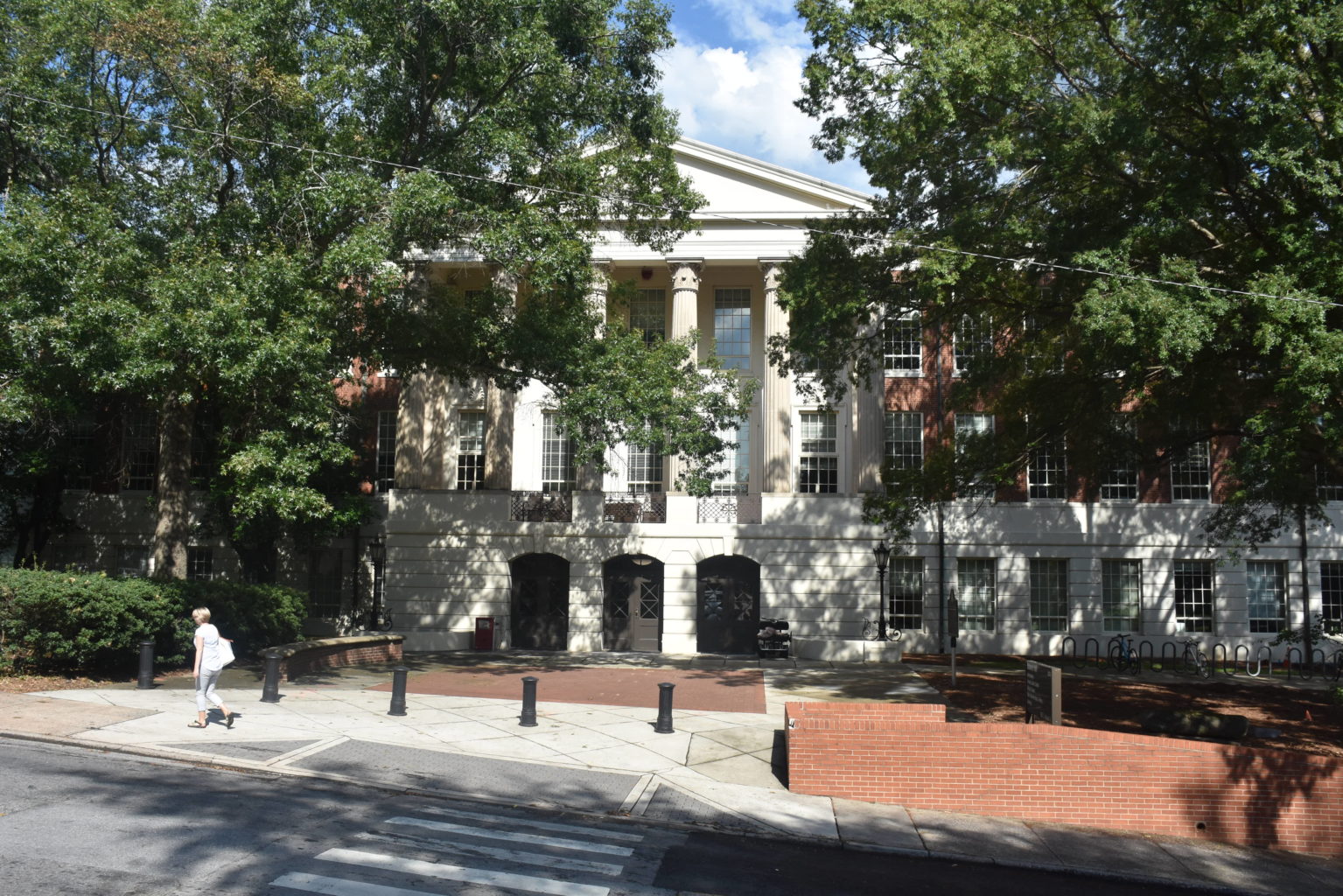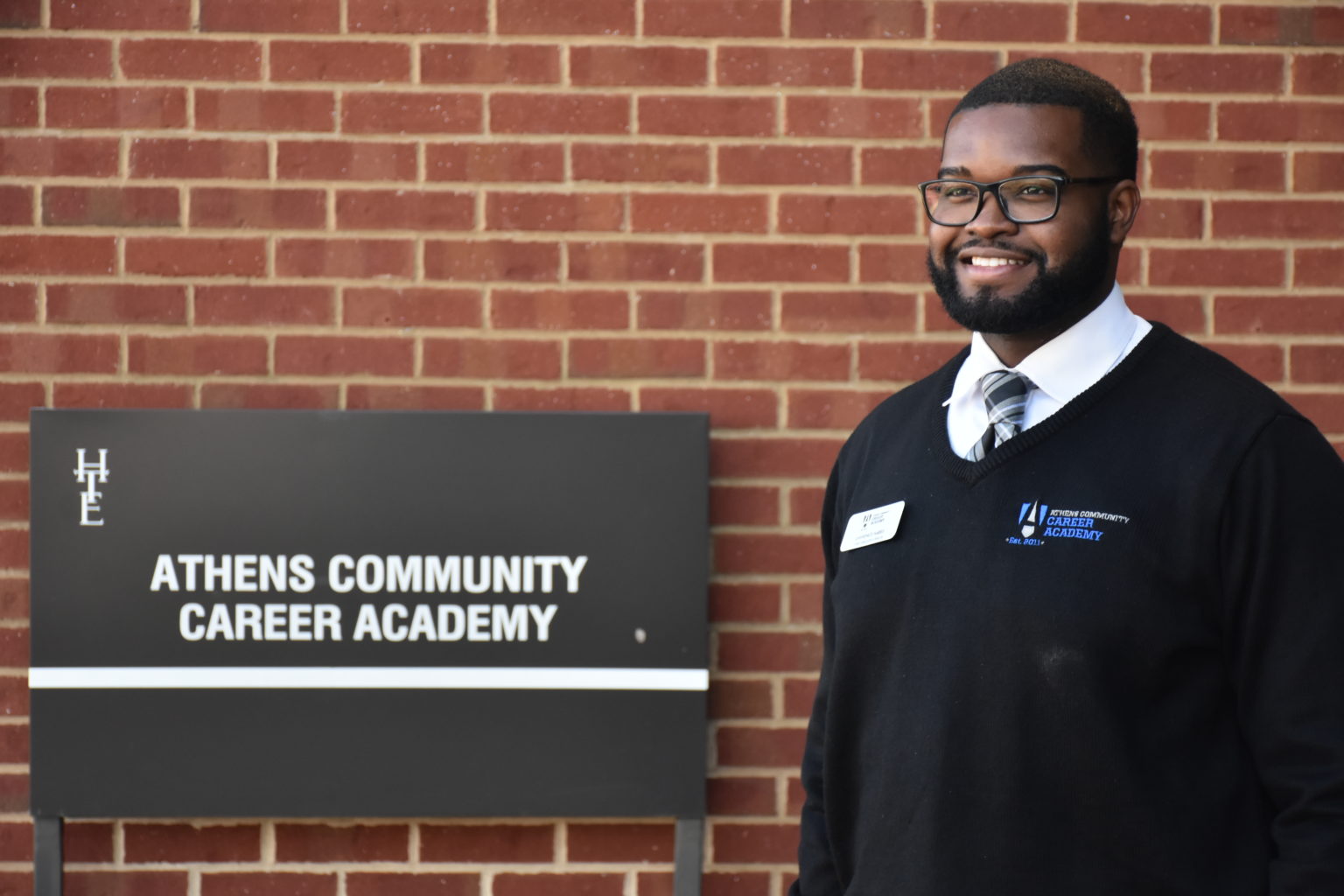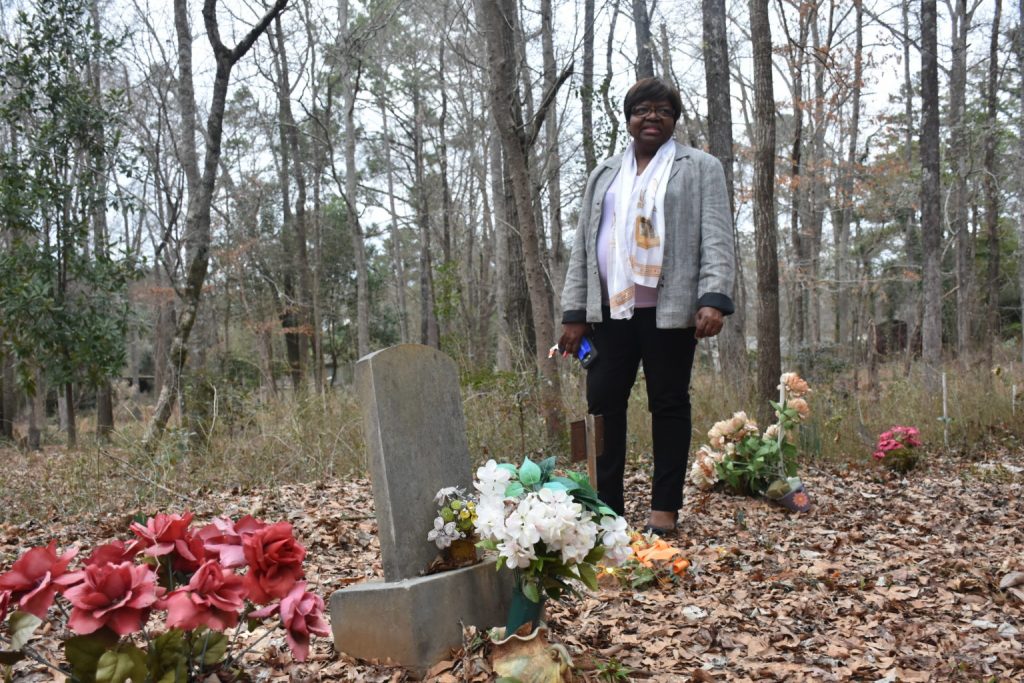
Baldwin Hall stands on the University of Georgia campus at the corner of Jackson Street and Baldwin Street. The building was constructed on top of numerous graves in the Jackson Street Cemetery. “Black people were not buried with white people and so, when you look at the geography of Jackson Street cemetery, the protected area is where the white people were buried, and the area that the building was built on, that’s the area where black people and slaves and former slaves were buried,” documentarian and 2018 UGA graduate Joe Lavine said. Photo by Krista Shumaker
“We never think about the sacrifices that people make and I just want people to think, ‘This beautiful campus that I’m walking on, a lot of it was constructed by slaves who were not paid — and some were killed or lynched.’ I want them to reflect and appreciate the world we’re in now because it was different years ago.”
— Lawrence Harris, Athens Community Career Academy CEO,
Baldwin Hall Memorial Task Force member

“Of the 105 (gravesites), 42 contained (human) remains on that location and, of those, 29 were able to be DNA tested. Most of those 29 had an indication of maternal African ancestry, but not all of them,” UGA Executive Director for Media Communications Greg Trevor said. “A majority of remains that were discovered were determined to most likely be slaves or former slaves.”
The remains are likely those of enslaved people hired by UGA from slave owners for construction and maintenance. Minutes from the UGA Board of Trustees meeting on Aug. 3, 1826 details the duties of enslaved people on campus, including cleaning students’ apartments and repairing buildings.
“We never think about the sacrifices that people make and I just want people to think, ‘This beautiful campus that I’m walking on, a lot of it was constructed by slaves who were not paid — and some were killed or lynched,’” Athens Community Career Academy CEO and Baldwin Hall Memorial Task Force member Lawrence Harris said. “I want them to reflect and appreciate the world we’re in now because it was different years ago.”
Numerous universities have recently addressed their history of involvement in the slave trade or support of the institution of slavery. For example, Brown University has completed extensive studies about their school’s history of ties to slavery and Georgetown University announced it would give admissions priority to the descendants of 272 enslaved people who contributed to the University in 1838.
“As painful as the subject may be, our pursuits must be in keeping with our training and our scholarly aims. This means acknowledging slavery, slaves and racism,” members of the UGA history department wrote in an Online Athens editorial. “This difficult reckoning with our history will place us among many peer and aspirational institutions. We look forward to joining the 40 or so institutions that have resolved to acknowledge and explore the involvement of their universities with slavery.”
The remains were reinterred at Oconee Hill Cemetery in March 2017 after UGA sought guidance from the office of the state archaeologist of Georgia.
“Our general recommendations when one encounters a burial is to protect it (and) leave it in place, but if that can’t happen, like you’re in the middle of a construction project, then if there’s more than one person, you should try to keep them together and try to keep them as close to the original spot as is appropriate and safe,” State Archeologist Bryan Tucker said.
The choice to reinter the remains at Oconee Hill Cemetery, where many former slave owners are buried, angered some community members, including Clarke County School District Board of Education member Linda Davis.
“I feel strongly that the ancestors that were disinterred at Baldwin Hall on Jackson Street should be buried with their descendants. I don’t think that a single one of them is happy about being buried at the feet of the people that owned them,” Davis said.
According to Davis, UGA should have worked with historically African-American cemeteries to determine an appropriate burial location.
“The right thing to me is to work with the African-American community and look at these two abandoned and neglected cemeteries, the Brooklyn and Gospel Pilgrim cemeteries, who could truly have benefited from a deeper partnership with the University, to build a fitting space in either one of those cemeteries,” Davis said.

Clarke County School Board of Education member Linda Davis stands in Brooklyn Cemetery on Feb. 7. Davis believes the remains found under Baldwin Hall should be reinterred at Brooklyn Cemetery, a historically black cemetery. “The right thing to me is to work with the African-American community and look at these two abandoned and neglected cemeteries, the Brooklyn and Gospel Pilgrim cemeteries, who could truly have benefited from a deeper partnership with the University, to build a fitting space in either one of those cemeteries,” Davis said. Photo by Elena Gilbertson Hall
However, Trevor believes UGA handled the issue appropriately by carefully following all instructions from the office of the State Archaeologist.
“Since the discovery of human remains on the Baldwin Hall construction site in the fall of 2015, the University of Georgia worked diligently to make sure these men, women and children were treated with the dignity and respect that they deserve,” Trevor said. “The entire process that the University followed (was in accordance with) the guidance of the State Archaeologist’s office, from discovery to reinterment.”
Documentarian and 2018 UGA graduate Joe Lavine, who has been working for several months on a documentary about the discovery of remains under Baldwin Hall, says that the handling of the issue was disrespectful to community members.
“The community is not saying that the administration did something illegal. The community is saying that the administration did something that was disrespectful,” Lavine said. “Yes, the University followed the order of the state archaeologist. But it didn’t follow other ethical guidelines that are pretty standard when you find the remains of a historically marginalized population.”
Athens Black History Bowl Committee co-chair Fred Smith has criticized UGA for the lack of community input and consultation of the black community in the decision-making process.
“The enslaved persons, through their labor, service and personhood, made important contributions to (UGA) and Athens,” Smith said. “It’s disappointing that UGA excluded from the process the voices on campus and in the local African-American community who have been outspoken concerning the University’s treatment of the burial grounds for enslaved persons.”
For Davis, this issue is personal.
“I will claim some of those bones because I am a descendant of people born here. I am three generations from slavery on my mother’s side of the family and only two generations away from slavery on my father’s side of the family, and I believe that some of my ancestors are in those bones that they found,” Davis said.
Clarke Central High School senior Amy Kamagate believes UGA missed an opportunity to make strides in improving its relationship to the black community.
“UGA is a predominantly white school and a lot of black students and black people don’t feel really comfortable with UGA sometimes. They don’t feel like they can relate sometimes,” Kamagate said. “I feel like if they acknowledged (their slave-owning history) it would have (helped) the African American community and Athens a bit more with that comfort and respect.”
In June 2018, UGA President Jere Morehead appointed a Baldwin Hall Memorial Task Force made up of 18 community members to plan the construction of a memorial to the enslaved people found at Baldwin Hall.
“Ultimately, we decided to raise a monument in front of Baldwin Hall that we felt like symbolized the people who were found there,” Harris said. “We felt like people could visit, schools could visit, kids, families and students as they walk by could see it from Jackson Street and see that the University is honoring the remains that were found there.”
According to Harris, the task force was intentional about creating a memorial with significant symbolism.
“There are, I believe, nine obelisks that are in a circle (because) the idea of a circle is for completion and unity. We got different shades of granite because there were people of different (races) buried there,” Harris said. “There’s a slight water feature there, (because) water is cleansing and so you think of cleansing after the passing of a loved one. There’s (also) a seating space around the memorial for people who want to sit in reverence.”
Davis believes the memorial is a step in the right direction to honoring the enslaved people found at Baldwin Hall.
“(The memorial will be) a fitting space where we can gather and remember those ancestors and remember what they did in terms of contributing to this community,” Davis said. “To be able to have a space wherein we can actually stand reverently to those people is very important to me and I think the University did a great job on that design.
Community organizer and activist Broderick Flanigan holds up a sign reading “Redress.” Flanigan believes the way the University of Georgia handled the discovery of human remains under Baldwin Hall was disrespectful to the black community. “As a black Athenian, it feels bad, it feels terrible (to see my community disrespected in this way),” Flanigan said. “Even in death, African-Americans and certain people are still being displaced and disrupted. There’s still not peace, even in death, for some groups of people, or so it seems.” Photo by Kelly Fulford
The monument was officially unveiled on Nov. 16. A group of community activists, including Lavine, protested during the unveiling ceremony, demanding that UGA President Jere Morehead acknowledge the University’s history with slavery.
“It is time for UGA to invest in reparational scholarships, and it is time for UGA to implement wages of at least $15 an hour for all its employees and take further steps to end its history of worker exploitation,” the protesters wrote in a statement. “The social and economic inequities that black Athenians face today are part of slavery’s ongoing legacy, and UGA must confront and bear responsibility for its complicity in this violent institution.”
Tucker believes the discovery of remains under Baldwin Hall provided an opportunity to learn and reflect on the history of UGA.
“Whenever burials are found, it gives modern people a chance to reflect on those times and those people,” Tucker said. “We encounter burials from all different parts of history, so I think it’s a good way for people to bridge between now and then and remember that the people in the past are just (like us), and they deserve our respect.”
Although the situation created tension between some members of UGA and the community, Harris believes the controversy provided a learning opportunity.
“If I learned anything, it’s that we aren’t finished as far as progress, but at least progress is being made,” Harris said. “It seems like there is an investment in seeing how can we bridge this gap between Athens, (the) people who live here, and (UGA), which is the largest landowner in Athens. I think being (on the memorial task force) has shown me that it isn’t hopeless. It’s showing me that things could kind of bridge and move forward and we can start having the right conversations.”
Story by Elena Gilbertson Hall and Eli Clarke
Photos by Kelly Fulford, Krista Shumaker, Elena Gilbertson Hall and Owen Donnelly
Video by Colin Frick
Package by Owen Donnelly, Elena Gilbertson Hall
